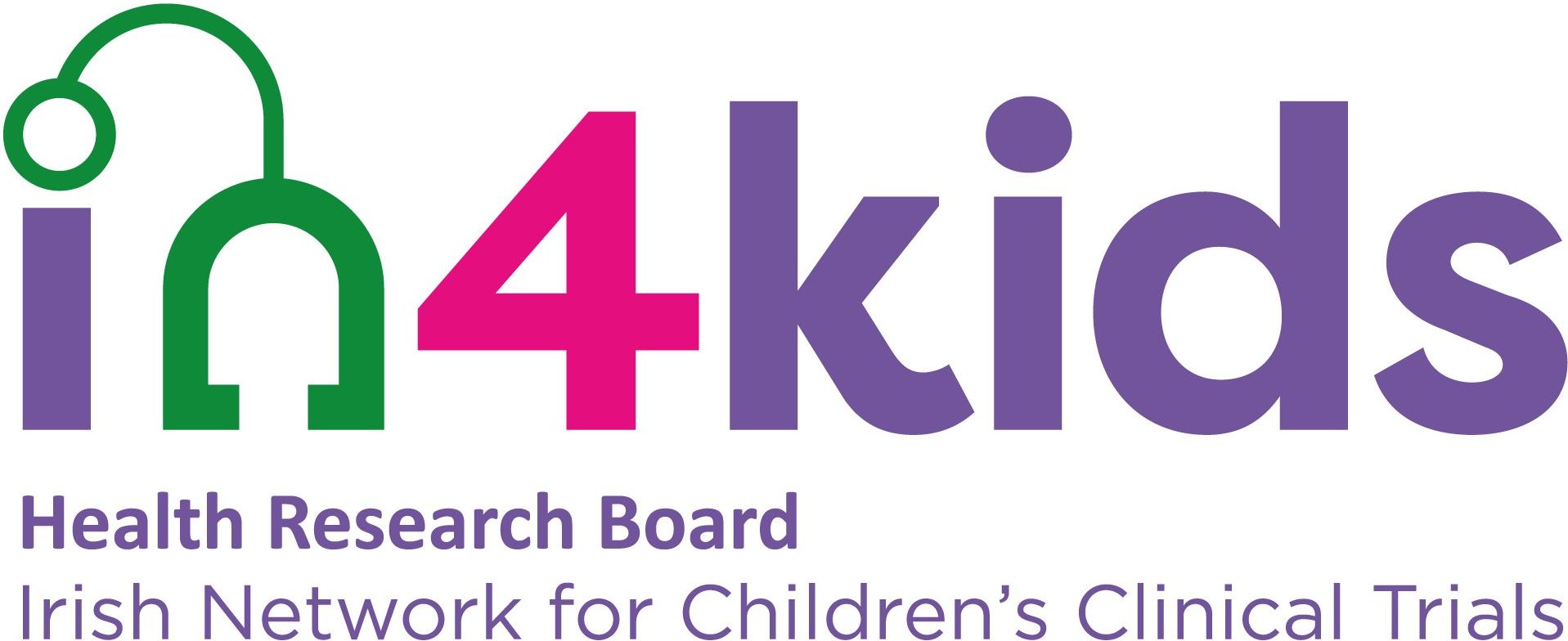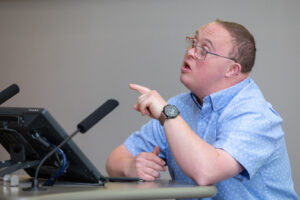A Look Inside the In4kids General Assembly
Have you ever stopped to think about how new medicines and treatments are tested for children or who decides what’s safe, fair, and necessary? On Friday June 6th, the In4kids General Assembly Meeting opened its doors to explore exactly that. With a buzzing crowd of researchers, health professionals, industry leaders, advocates, and most importantly, young people, the event brought powerful conversations about the future of children’s health research right to the forefront.
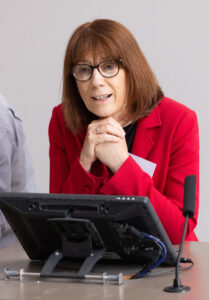
Prof Geraldine Boylan
Kicking Off with Purpose
The day began with a warm introduction from Prof Geraldine Boylan, who leads the In4kids network and is Director of the INFANT Research Centre at University College Cork (UCC).
She made one thing clear: children deserve access to top-tier clinical trials, and their voices should be at the heart of it all. Her message set the tone.
Research isn’t something that happens to children, it’s something that should involve them.
Then came Ross O’Neill from Down Syndrome Ireland, whose words lit up the room.
“Research is about being active,” he said. “We put research in our minds, that helps us all live.”
His talk reminded us that you don’t have to wear a lab coat to be part of research. Asking questions, sharing experiences, and caring; that’s where it all begins.
The Reality of Running Trials for Children
One major focus of the day was the current state of clinical trials involving children in Ireland. Prof Susanne (Susa) Benseler from Children’s Health Ireland spoke candidly about the challenges. Although Ireland has talented researchers, more support and funding are needed to meet children’s needs properly.
Gwynne Morley from IQVIA Ireland added a broader perspective, pointing out that Ireland is part of a much larger global network of paediatric research. From rare genetic conditions to childhood cancers, she emphasized how vital collaboration is.
“Ireland needs to present itself as one,” she said, stressing the need for all sectors, public and private, to work together.
Then we heard from Prof Pauline Frizelle, from UCC, who introduced “Happy Talk”; a programme helping children with developmental language disorder (DLD). She described it as the most common learning difficulty that barely gets talked about. Her work focuses on children in disadvantaged areas, using play-based methods to improve communication. It’s a perfect example of research that’s making a difference on the ground.
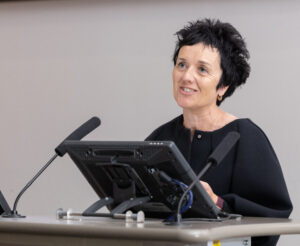
Prof Pauline Frizelle
Stories That Stick with You
Some of the most memorable moments came from personal stories. Lily Collison, an author and advocate for cerebral palsy, spoke about her family’s experience navigating research and treatment options for her son. She recalled carrying just two research papers in her pocket that gave her the courage to move forward.
Her message was simple: don’t get lost in statistics; think about the actual children behind the numbers
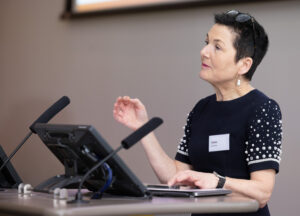
Lilly Collison
Putting Young People at the Centre
Another important conversation centred on ethics and how young people are involved in research.
Prof Veronica Lambert, Dublin City University made it clear that children shouldn’t just be asked to sign a form, they should be part of the decision-making process. She highlighted a toolkit called Is Research Right for Me? designed to help young people understand what getting involved really looks like.
Prof Lambert also spoke about the Resource for Ethical Collaboration with Children and Young People, which aims to make research partnerships more respectful and meaningful (It was even shaped by feedback from In4kids!) showing how young voices are being listened to.
Prof Eleanor Molloy, In4kids co-lead, Professor and Chair of Paediatrics, Trinity College Dublin followed with a presentation on the National Young Person’s Advisory Group (YPAG),which gives young people a real say in how research is planned and carried out.
One quote from a young member of the group really stood out: “Nothing about me, without me.”
That idea of including young people every step of the way was a recurring theme throughout the day. We were delighted to have some members of the YPAG in attendance.
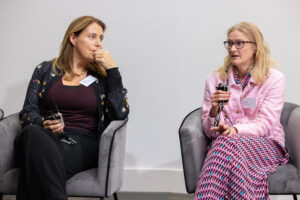
Eleanor Molloy and Veronica Lambert
Zooming Out: Ireland and the European Network
After lunch, we turned our focus to what’s happening across Europe. Prof Mark Turner, CEO of conect4children-Stichting explained how the conect4children initiative links trials across multiple countries, speeding up access to new treatments.
Prof Michael Barrett, Children’s Health Ireland then spoke about PERUKI, a network focused on emergency paediatric care, and how it could help shape better care in Ireland.
Prof Paul Fleming, Queen Mary University of London shared insights from the North Thames Clinical Research Network in the UK. His key message –
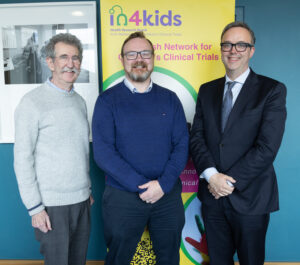
Mark Turner, Michael Barrett and Paul Fleming
We should learn from each other. Ireland’s role in these international networks is crucial not just for access to innovation, but for ensuring that Irish children benefit from advances in care being made elsewhere.
Panels That Sparked Real Conversation
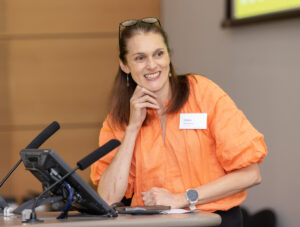
Two panel sessions rounded off the day, diving into how Ireland can overcome the practical hurdles to running clinical trials with children. The second, chaired by Prof Deirdre Murray, Chair of Early Brain Injury and Cerebral Palsy, UCC featured a fantastic mix of voices from clinicians and researchers to parent advocates, entrepreneurs and health research board leaders. They talked about everything from making research more inclusive to ensuring it reflects what families actually need.
Panellists included Oonagh Ward – HRB, Mark O’Neill FCA- HAON Life Sciences, Prof Brian Walsh – UCC, Mary Costello – CHI and Mandy Daly – Irish Neonatal Health Alliance(INHA).
One standout moment came from Mark O’Neill of HAON Life Sciences, who reminded us,
“It’s not just the patient, it’s the family unit; the holistic effect.”
His words captured something everyone in the room seemed to agree with: that when we design trials for children, we have to think beyond just the individual and consider the whole support system around them.
Why This Matters; Especially to Young People
By the end of the day, one thing was certain. Young people have a crucial role to play in shaping the future of healthcare. Whether you’re interested in science, passionate about fairness, or simply curious, there’s a space for you in this conversation.
We were delighted to bring questions from our YPAG to the conference which were met with enthusiastic responses. The questions focused on real life issues that our young people with childhood illnesses are facing, including can we make the gas used for anaesthesia smell better to help reduce anxiety around surgeries, and are there trials showing we can replace ICP monitors with headbands, potentially reducing the number of surgeries required. While the first step is always talk to your clinician first and then reach out to local and international patient organisations, it sparked an interesting conversation about how difficult it can be to get research up and running in ireland – hopefully something we can change!
Clinical trials might sound technical, but at their core, they’re just structured ways of answering big questions. What treatments work? What’s safe? What could be better? And when young people are part of those discussions from the beginning, the answers become more meaningful.
Wrapping Up
The In4kids General Assembly wasn’t just an event. It was an invitation. An invitation to get involved, speak up, and be part of something bigger. It showed that change in healthcare doesn’t just come from policies or big institutions. It starts with people, especially young ones, who care and want to make a difference.
If you’re committed to advancing the future of children’s health, know this:
You can be part of the research. Your voice does matter. And together, we can build a future that is better, fairer, and more inclusive—for everyone.
As one speaker reminded us in closing: “Never underestimate the power of one.”
